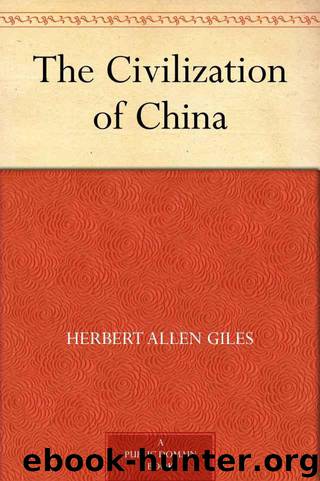The Civilization of China by Giles Herbert Allen

Author:Giles, Herbert Allen [Giles, Herbert Allen]
Language: eng
Format: mobi
Tags: China -- History, China -- Civilization
Published: 2012-05-16T16:00:00+00:00
CHAPTER VII—PHILOSOPHY AND SPORT
Chinese philosophy covers altogether too large a field to be dealt with, even in outline, on a scale suitable to this volume; only a few of its chief features can possibly be exhibited in the space at disposal.
Beginning with moral philosophy, we are confronted at once with what was in early days an extremely vexed question; not perhaps entirely set at rest even now, but allowed to remain in suspense amid the universal acceptance of Confucian teachings. Confucius himself taught in no indistinct terms that man is born good, and that he becomes evil only by contact with evil surroundings. He does not enlarge upon this dogma, but states it baldly as a natural law, little anticipating that within a couple of centuries it was to be called seriously in question. It remained for his great follower, Mencius, born a hundred years later, to defend the proposition against all comers, and especially against one of no mean standing, the philosopher Kao (Cow). Kao declared that righteousness is only to be got out of man's nature in the same way that good cups and bowls are to be got out of a block of willow wood, namely, by care in fashioning them. Improper workmanship would produce bad results; good workmanship, on the other hand, would produce good results. In plain words, the nature of man at birth is neither good nor bad; and what it becomes afterwards depends entirely upon what influences have been brought to bear and in what surroundings it has come to maturity. Mencius met this argument by showing that in the process of extracting cups and bowls from a block of wood, the wood as a block is destroyed, and he pointed out that, according to such reasoning, man's nature would also be destroyed in the process of getting righteousness out of it.
Again, Kao maintained that man's nature has as little concern with good or evil as water has with east or west; for water will flow indifferently either one way or the other, according to the conditions in each case. If there is freedom on the east, it will flow east; if there is freedom on the west, it will flow west; and so with human nature, which will move similarly in the direction of either good or evil. In reply, Mencius freely admitted that water would flow either east or west; but he asked if it would flow indifferently up or down. He then declared that the bent of human nature towards good is precisely like the tendency of water to flow down and not up. You can force water to jump up, he said, by striking it, and by mechanical appliances you can make it flow to the top of a hill; but what you do in such cases is entirely contrary to the nature of water, and is merely the result of violence, such violence, in fact, as is brought into play when man's nature is bent towards evil.
"That which
Download
This site does not store any files on its server. We only index and link to content provided by other sites. Please contact the content providers to delete copyright contents if any and email us, we'll remove relevant links or contents immediately.
4 3 2 1: A Novel by Paul Auster(12365)
The handmaid's tale by Margaret Atwood(7752)
Giovanni's Room by James Baldwin(7319)
Big Magic: Creative Living Beyond Fear by Elizabeth Gilbert(5753)
Asking the Right Questions: A Guide to Critical Thinking by M. Neil Browne & Stuart M. Keeley(5752)
Ego Is the Enemy by Ryan Holiday(5412)
The Body: A Guide for Occupants by Bill Bryson(5077)
On Writing A Memoir of the Craft by Stephen King(4925)
Ken Follett - World without end by Ken Follett(4719)
Adulting by Kelly Williams Brown(4564)
Bluets by Maggie Nelson(4544)
Eat That Frog! by Brian Tracy(4518)
Guilty Pleasures by Laurell K Hamilton(4437)
The Poetry of Pablo Neruda by Pablo Neruda(4090)
Alive: The Story of the Andes Survivors by Piers Paul Read(4017)
White Noise - A Novel by Don DeLillo(4001)
Fingerprints of the Gods by Graham Hancock(3985)
The Book of Joy by Dalai Lama(3970)
The Bookshop by Penelope Fitzgerald(3843)
